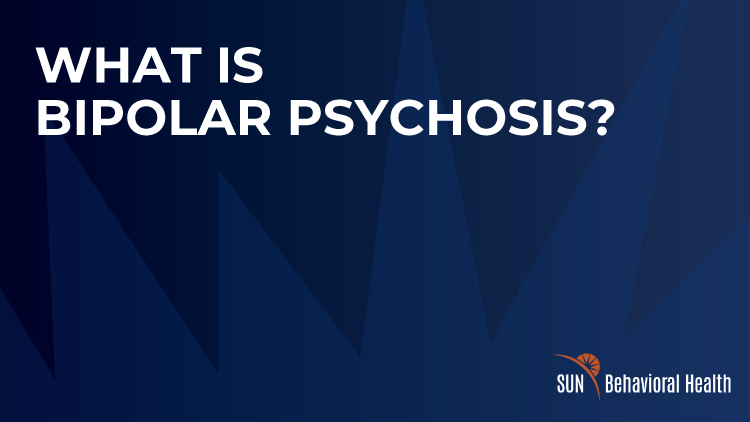Services
- Home
- Mental Health Services
- Who We Treat
- How We Treat
- Patients & Visitors
- About
close

Almost 800,000 Texan adults reported having a serious mental illness within the past year. General psychosis can occur because of a variety of mental illnesses and outside influences like lack of sleep or substance use, but today let’s talk about the reasons why some people with bipolar experience psychosis.
What is bipolar psychosis? Does everyone who has bipolar disorder experience psychosis? Is there a way to prevent it or better manage it? These are all questions you might have if you’ve experienced bipolar psychosis before, or if you’ve recently been diagnosed with bipolar disorder. At SUN Behavioral Health here in Houston, TX, we like to answer the questions coming from our community. Having easy access to reliable information regarding mental health benefits everyone.
Psychosis is when you experience and interpret reality in a way that's very different from those around you. When it comes to bipolar disorder, this most commonly occurs during manic episodes, which is a time of extreme high or energy. This doesn’t mean it can’t happen during depressive episodes or mixed episodes, it’s just less common.
Overall, many people who have bipolar disorder might not ever experience psychosis. It’s not a guaranteed side effect.
Bipolar disorder has three primary types of episodes someone might experience. Not everyone experiences episodes evenly; some might have more manic than depressive or vice versa. Psychosis can occur during any type of episode, so let’s talk further about what these episodes can look like.
Bipolar disorder is most commonly diagnosed in teens and young adults, but that doesn’t mean that children can’t have bipolar disorder. Bipolar in children can come in combination with other mental conditions such as ADHD, depression, or anxiety disorders. If you notice your child going through emotional cycles of extreme highs and lows, or if your child has sudden changes in routine such as eating or sleeping patterns, they might have bipolar disorder.
Unlike adults, children are more likely to be destructive during manic episodes as opposed to experiencing elevated happiness and energy. In addition, their depressive episodes are more likely to consist of physical side effects like headaches, stomach aches, and exhaustion.
When it comes to psychosis for those with bipolar disorder, it’s more likely to occur in adults than adolescents. This doesn’t mean that all adults with bipolar disorder will experience psychosis, however.
Psychosis can consist of many symptoms that already occur within their normal episodes, with the addition of a few things. High energy for manic episodes still holds true, and feelings of low self-worth or suicidal ideation happen with depressive episodes. In addition to these symptoms, many people experience things like delusions and hallucinations. This ties into them not being able to discern their reality from actual reality.
A bipolar psychosis episode can’t always be detected before it happens, but there are some things that can play into your potential for experiencing it.
Psychosis as a whole can occur in people who don’t have bipolar. Other things that are known to trigger psychosis include schizophrenia, severe stress and anxiety, severe depression, and even lack of sleep. These components combined with bipolar disorder can put you at a higher risk of experiencing psychosis.
Because some symptoms from normal episodes can overlap and still be experienced during psychosis, it’s not always easy to know when someone might be going through psychosis. If you notice signs that your loved one’s perception of reality isn’t the same as yours, such as talking to things that aren’t there, talking about things that didn’t happen, extreme paranoia, or other delusions and hallucinations they’re probably going through psychosis.
It’s important to know that, as with most medical and mental conditions, it is possible to have both bipolar disorder and schizoaffective disorder. The two share overlapping symptoms, but they’re not exactly the same.
Bipolar disorder primarily consists of “episodes,” which we briefly touched on earlier. Most people experience either manic, depressive, or mixed episodes. There are three types of bipolar disorder, each with its own set of symptoms.
Schizoaffective disorder, sometimes referred to as schizophrenia, consists of episodes of delusions, hallucinations, and out-of-character behavior. While people with bipolar disorder can also experience delusions and hallucinations, as well as seemingly sudden changes in personality, that is not the primary state of mind for someone with bipolar disorder.
Bipolar disorder is a treatable mental illness. It can be addressed in a handful of ways depending on what will work best for the individual. It usually involves a combination of medication and therapy. Pairing the two together allows for managing symptoms so that the person can primarily focus on their therapy and healing instead of worrying about side effects.
Here at SUN Behavioral Health in Houston, we offer both inpatient and outpatient treatment for those wanting to better manage their bipolar disorder. We also offer co-occurring disorder treatment options. A co-occurring disorder is when someone has both a mental illness and a substance use disorder. We believe in treating the whole person, not just their symptoms. Our goal is to help you reach yours.
If you have any questions about our treatment options, feel free to reach out and give us a call today at (713) 796-2273.
Depending on your type of bipolar, episodes could occur every couple of weeks and last for days or weeks at a time. Every person is different, and depending on how they’re managing their bipolar, the gap between episodes could be longer.
Studies show that people with parents who have bipolar disorder are more likely to have it themselves, so there are genetic components to bipolar disorder.
When someone is experiencing psychosis, they aren’t seeing the same reality as you. It’s important to be calm and try to work with them regarding what they perceive as reality. If they start to become aggressive, always make sure you care for yourself as well.